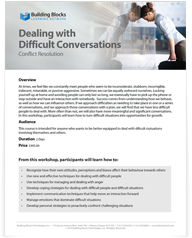Audience
Overview
At times, we feel like we constantly meet people who seem to be inconsiderate, stubborn, incorrigible, indecent, miserable, or passive-aggressive. Sometimes we can be equally awkward ourselves. Locking yourself up at home and avoiding people can only last so long, we eventually have to pick up the phone or step outside and have an interaction with somebody. Success comes from understanding how we behave, as well as how we can influence others. If we approach difficulties as needing to take place in one or a series of conversations, and we approach those conversations with a plan, we will find that we have less difficult people to deal with. More often than not, we will also have more meaningful and significant conversations. In this workshop, participants will learn how to turn difficult situations into opportunities for growth.
Topics
- Explore how conflict is a very normal part of healthy relationships
- Learn about the benefits of confrontation and whether or not to become involved in a situation
- Learn techniques to find resolution and to prevent problems from occurring
- Get to the heart of a problem to deal with deeper issues and create a better workplace
- Explore ways of dealing with problems to create more productive working relationships through problem-solving
- Increase awareness of your behavioral patterns and change your response to situations
- Build relationships through empathy and engaging others
- Implement guidelines to help you manage and express anger, deal with angry people and use assertive anger
- Increase your assertive muscle
- Learn de-stressing techniques that you can use when things get difficult
From this workshop, participants will learn how to:
- Recognize how their own attitudes, perceptions and biases affect their behaviour towards others
- Use new and effective techniques for dealing with difficult people
- Use techniques for managing and dealing with anger
- Develop coping strategies for dealing with difficult people and difficult situations
- Implement communication techniques that help move an interaction forward
- Manage emotions that dominate difficult situations
- Develop personal strategies to proactively confront challenging situations
Unable to attend?
Please contact us to discuss alternative dates that work for you.
Can't see a date you previously saw?
Do not hesitate to contact us.
Course Outline


